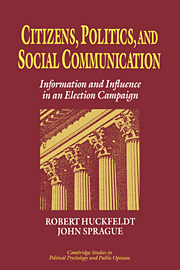Book contents
- Frontmatter
- Contents
- Acknowledgments
- I Democratic politics and social communication
- II Electoral dynamics and social communication
- III Networks, political discussants, and social communication
- IV The organizational locus of social communication
- 11 One-party politics and the voter revisited: Strategic and behavioral bases of partisanship
- 12 Political parties and electoral mobilization: Political structure, social structure, and the party canvass
- 13 Alternative contexts of political preference
- 14 Political consequences of interdependent citizens
- Bibliography
- Index
14 - Political consequences of interdependent citizens
Published online by Cambridge University Press: 22 March 2010
- Frontmatter
- Contents
- Acknowledgments
- I Democratic politics and social communication
- II Electoral dynamics and social communication
- III Networks, political discussants, and social communication
- IV The organizational locus of social communication
- 11 One-party politics and the voter revisited: Strategic and behavioral bases of partisanship
- 12 Political parties and electoral mobilization: Political structure, social structure, and the party canvass
- 13 Alternative contexts of political preference
- 14 Political consequences of interdependent citizens
- Bibliography
- Index
Summary
The question arises quite naturally: What difference does it all make? We have argued that democratic citizenship involves something more than individually isolated and politically independent citizens making choices that are socially and politically divorced from their surroundings. Rather, citizens are fundamentally interdependent – they depend on one another for political information and guidance, and in the process of becoming informed they pass along distinctive interpretations and viewpoints. Moreover, the social communication of political information is itself subject to the political and social environment. Partisan dominance, party organization, and other organizational and institutional formations serve both to accelerate and impede the transmission and recognition of particular viewpoints. But if we are correct, does anything really change? Does the argument generate implications for political analysis in general and our understanding of democratic electoral politics in particular?
Perhaps the most important consequence lies in the ratification of something that Tip O'Neill knew all along: All politics is local politics. The Speaker may have had a different point of reference in mind when he made the observation, but our argument runs in a complementary direction. The point of reference for our own work is the construct of the national electorate. Journalists and pundits make reference to it, political scientists explain it, pollsters take its pulse. And while the concept of a national electorate is often quite useful, it remains an intellectual construct – a convenience for purposes of summarizing political behavior.
- Type
- Chapter
- Information
- Citizens, Politics and Social CommunicationInformation and Influence in an Election Campaign, pp. 282 - 292Publisher: Cambridge University PressPrint publication year: 1995

